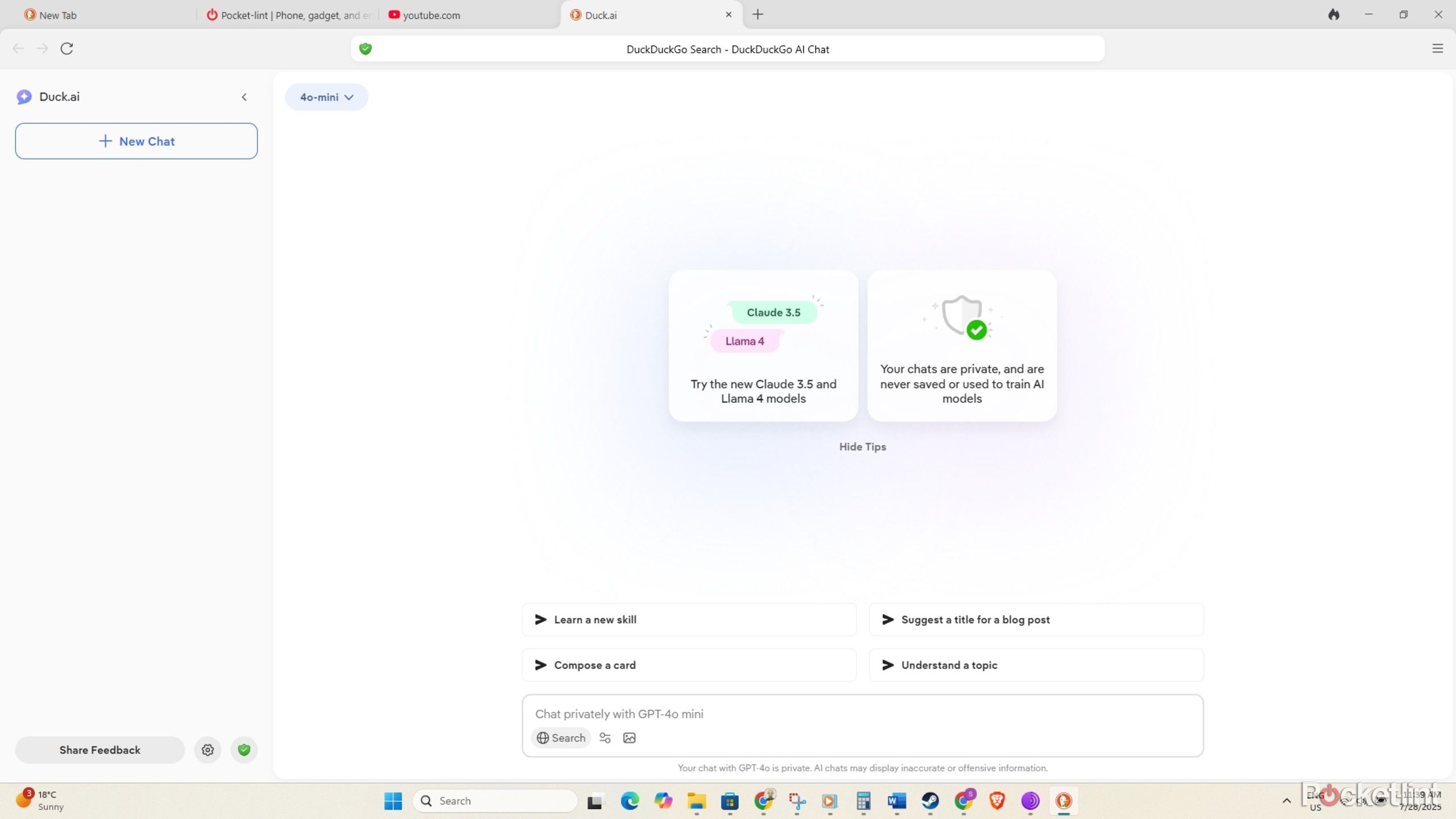Summary
- Tor is a secure browser routing traffic through encrypted nodes, prioritizing privacy and data protection.
- DuckDuckGo offers anonymous browsing, cookie consent pop-up removal, and privacy-focused search engines.
- Opera GX is ideal for gamers, offering a built-in VPN and ad blocker for a better browsing experience.
Mainstream browsers like Microsoft Edge and Google Chrome are user-friendly and feature-rich, but they don’t prioritize privacy. That’s why I’ve tried many privacy-focused browsers on my smartphone and laptop this year in my quest for the best online experience. Each has unique features to prevent online tracking and data collection, and most include ad or pop-up blockers to reduce unwanted notifications.
These features enhance my security by preventing third parties from accessing my browsing history and personal information, and potentially exposing it to the public domain. Pop-ups and unwanted ads get in the way of my browsing, and I appreciate having blockers that reduce their frequency, allowing me to use the internet in peace. I’ve tried numerous privacy browsers, and these five stand out as the best.
1
Tor
Hide your location
Tor is a free and open-source privacy browser based on a modified version of Mozilla’s Firefox. It works differently from most browsers by routing all my web traffic through encrypted servers called nodes. This system adds an extra layer of security, preventing third parties from tracking my location and internet activity, as the data originates from the Tor network rather than my IP address.
Its disadvantage is that I can’t add extensions, which can affect its privacy features.
Apart from the node system, Tor has other features that make it a safer browsing option. It includes the privacy-focused DuckDuckGo as its default search engine and, by default, does not store cookies or other browsing history, which are only retained for the current session. Tor is probably the most secure browser, but its disadvantage is that I can’t add extensions, which can affect its privacy features.
2
DuckDuckGo
Stop pop-ups automatically
DuckDuckGo evolved from a search engine into a fully-fledged browser with numerous privacy features. The browser doesn’t store your search information, like data profiles or IP addresses, so there are fewer ads to worry about. It also has a feature called “Fireproof” which I can activate on a per-site basis if I’d like to store my login details or other information.
DuckDuckGo has a great feature that automatically removes cookie consent pop-ups.
Most AI chatbots require an account and record the information you put into them. This browser prevents this by including the Duck.ai feature, which lets me use models, like Claude 3.5 and Llama 4, anonymously. My chats are stored locally on my device and aren’t uploaded to any servers. DuckDuckGo has a great feature that automatically removes cookie consent pop-ups. The browser will use my saved preferences to provide maximum protection and the fewest cookies, so when a pop-up appears on my screen, it will disappear in a matter of seconds.
3
Opera GX
Built-in VPN
Opera GX is the best privacy browser for gamers. It’s a modified version of the standard Opera browser, retaining the same excellent privacy options while upgrading the design. Preventing online tracking is easy with the built-in VPN located to the left of the address bar. It lets me choose between servers in America, Asia, or Europe, and — when activated — hides my IP address and location.
The built-in ad blocker is another handy feature of Opera-GX. This feature is easily accessible in the top-right corner of the browser, and it has improved my browsing because there are fewer unwanted ads to distract me. Gamers will love features like the RAM limiter, which controls the amount of memory the browser can use, and the GX Corner, which displays the latest deals and news about their favorite titles.
4
Librewolf
Safer searching and ad blockers
Librewolf is another Firefox-based browser with enhanced privacy and security features. Librewolf has strict default traffic protection, which stops social media trackers, cryptominers, and fingerprinters from running on visited sites. It has the Ublock ad blocker baked into the interface to stop pop-ups, remote fonts, and large media elements from the sites I visit. It can also disable Javascript and cosmetic filtering and displays the number of scripts and trackers it’s blocked.
Librewolf includes search engines, such as DuckDuckGo, MetaGer, Mojeek, and Startpage to choose from.
Searching is safer with various privacy engines to choose from. Librewolf includes search engines, such as DuckDuckGo, MetaGer, Mojeek, and Startpage, so I can avoid mainstream options like Google, which may collect my data. I appreciate that it offers the option to clear all browsing and download history, as well as cookies and site data, whenever I close the browser, ensuring that none of it is stored on my PC.
5
Brave
Access Chrome extensions with privacy
Brave is a Chromium-based browser and one of the best options if I need access to the vast range of Google-compatible extensions, while maintaining my privacy. Like other browsers listed here, it has a built-in ad blocker with multiple configuration options. It’s set to block trackers and ads by default, and I can use the convenient toggles to stop scripts, fingerprinting, and third-party cookies. I can also configure it to forget me as soon as a session closes to prevent it from storing cookies and my login details.
This browser has a built-in VPN, but it is subscription-based and costs around $10 per month to activate. Unsurprisingly, it uses Google as its default search engine, with alternatives like DuckDuckGo, Startpage, or Qwant available for privacy-conscious users. Most browsers have a private window option, and Brave takes it a step further with a feature that connects it to the Tor network to enhance my online anonymity.





